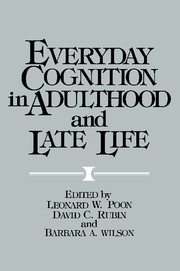Book contents
- Frontmatter
- Contents
- List of contributors
- Preface
- Part I Adult cognitive abilities in the laboratory and in real-life settings: Basic theoretical and methodological issues
- Part IA Systematic approaches to laboratory and real-world research
- Part IB Combining laboratory and real-world research
- Part II Cognition in adulthood and late life: Findings in real-life settings
- Part IIA Everyday cognitive abilities
- Part IIB Concomitant influences
- Part III Cognitive enhancement and aging: Clinical and educational applications
- Part IIIA Issues and perspectives
- 28 Varieties of memory compensation by older adults in episodic remembering
- 29 Improvement with cognitive training: Which old dogs learn what tricks?
- Part IIIB Enhancement approaches
- Part IIIC Designing programs for cognitive rehabilitation
- Subject index
- Author index
29 - Improvement with cognitive training: Which old dogs learn what tricks?
Published online by Cambridge University Press: 05 October 2013
- Frontmatter
- Contents
- List of contributors
- Preface
- Part I Adult cognitive abilities in the laboratory and in real-life settings: Basic theoretical and methodological issues
- Part IA Systematic approaches to laboratory and real-world research
- Part IB Combining laboratory and real-world research
- Part II Cognition in adulthood and late life: Findings in real-life settings
- Part IIA Everyday cognitive abilities
- Part IIB Concomitant influences
- Part III Cognitive enhancement and aging: Clinical and educational applications
- Part IIIA Issues and perspectives
- 28 Varieties of memory compensation by older adults in episodic remembering
- 29 Improvement with cognitive training: Which old dogs learn what tricks?
- Part IIIB Enhancement approaches
- Part IIIC Designing programs for cognitive rehabilitation
- Subject index
- Author index
Summary
The term “cognitive training ” conjures up the image of young students in a classroom, receiving instruction from a teacher. There is the implicit assumption that the young students did not possess cognitive abilities prior to cognitive training, so that the focus of training is on de novo learning. The critical question is whether or not, as a result of cognitive training, there is acquisition of specific knowledge and skills. However, cognitive training is being increasingly employed as a research paradigm across the life span. Questions regarding the purpose and effectiveness of cognitive training at later life stages often are quite different from those relating to the young students. Cognitive training in old age has recently been of particular interest, given the normative pattern of intellectual decline in this developmental period.
This chapter provides a selective review of recent research on cognitive training in later adulthood. The research literature will be reviewed with regard to five major questions: What cognitive abilities have been the targets of cognitivetraining research? What is modified as a function of training? How large is the magnitude of the training effect? Who benefits from cognitive training? Are training effects maintained over time? The literature review will focus on the psychometric mental abilities and the cognitive problem-solving skills that have been studied via a training paradigm. The chapters in this volume by Bäckman (Chapter 28), West (Chapter 30), and Yesavage, Lapp, and Sheikh (Chapter 31) review the memory-training literature.
- Type
- Chapter
- Information
- Everyday Cognition in Adulthood and Late Life , pp. 545 - 570Publisher: Cambridge University PressPrint publication year: 1989
- 8
- Cited by



